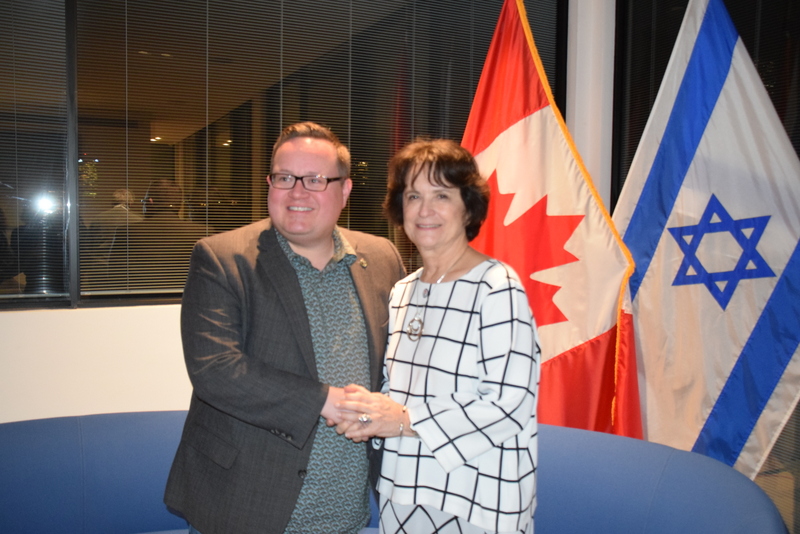Canadian Ambassador to Israel Deborah Lyons welcomed leaders from three of Canada’s largest organizations in the disability field to her official residence in Tel Aviv on Feb. 12, to kick off the first Canada-Israel Inclusion Mission. She spoke about the importance of sharing knowledge and expertise, in order to remove barriers for people with disabilities, an area in which she said both Israel and Canada have made impressive strides.
Lyons pointed out that 15 per cent of the global population experiences some form of disability, a number that’s expected to increase to 25 per cent by 2050. That 25 per cent, she said, represents a vast potential for innovation, social contribution and economic opportunity, and both countries are leading the way.
“Israel is really a miracle,” she said. “This very young country … has had something like 12 or 13 Nobel Prize winners, advances in education, high tech, water management, life sciences, cybersecurity, artificial intelligence … I could go on. But what is equally impressive is that incredible spirit and desire to contribute to others.”
Canada shares this desire, Lyons said. “I get a lot of people who come up to me and say, ‘You know what gives me hope? Canada.’ ”
READ: DISABILITY DOESN’T MEAN YOU CAN’T ENJOY ISRAEL
The disabilities mission to Israel was spearheaded by Reena, which provides services for people with developmental disabilities in the Greater Toronto Area, and included delegates from March of Dimes Canada, which focuses on physical disabilities, and Holland Bloorview Children’s Rehabilitation Hospital, which supports children and youth with disabilities, complex medical conditions, illnesses and injuries, among others.
Representatives of the three Canadian organizations briefly presented what they view as the main challenges to inclusion that their stakeholders face.
Common problems ranged from lack of funding, to an aging population with increasingly complex needs, along with a lack of services to bridge transition periods, such as from pediatric to adult services, or adult to geriatric services. Several identified the need for personal budgeting to accommodate individuals’ self-identified priorities, rather than having services dictated by their type of disability.
The Canadian delegates were joined by Liberal MPs Pamela Damoff and Bryan May, and Conservative MP John Barlow.
May – who’s the chair of the standing parliamentary committee on human resources, skills and social development and the status of persons with disabilities – told The CJN that it was an honour to have been asked to join the mission.
“It’s all about perspective,” he said. “It’s all about understanding best practices from other countries, learning from others, learning from others’ mistakes, making sure we’re moving together not just as a country, but as a planet.”
Canadian lawyer and lecturer David Lepofsky, who campaigns for disability rights as well as speaking in Israel and abroad on disability issues, compared the progress Israel and Canada have made in terms of accessibility.
“I can’t tell you one country is better than the other,” he said. “Israel is doing some things and should be proud. Canada is doing some things and should be proud. And they both have things they should be doing.”
Lepofsky, who is blind, pointed out that even the aging Tel Aviv hotel in which delegates were staying had braille numbers on the elevator buttons and voice announcements for each floor. Yet in terms of including children with disabilities in mainstream schools, Israel remains far behind comparable educational systems in North America.
In Canada, on the other hand, he believes Bill C-81, the landmark Accessible Canada Act that’s currently making its way through the Senate, doesn’t go far enough towards creating true equality.
Over the nine-day mission, delegates visited organizations all over the country that showcase Israeli innovation, including ReWalk, a company that’s pioneering exoskeleton technology that allows individuals in wheelchairs to stand and walk, Beit Issie Shapiro, which provides services and therapy to people with a wide range of disabilities, and several organizations that offer accessible nature experiences.
March of Dimes Ontario board member Faisal Saeed told The CJN that he got on board a year ago, when the mission was still in the planning stages as “a multi-dimensional, multi-faith group, representing different kinds of disabilities.” Saeed, who is Muslim and uses a wheelchair, pointed out that grassroots involvement and shared learning is essential, since there’s no one-size-fits-all solution. “If you build a ramp, it’s not going to solve all the problems,” he said. “We’re here to learn from Israelis with disabilities … how to make society more inclusive across religious and legal barriers.”
